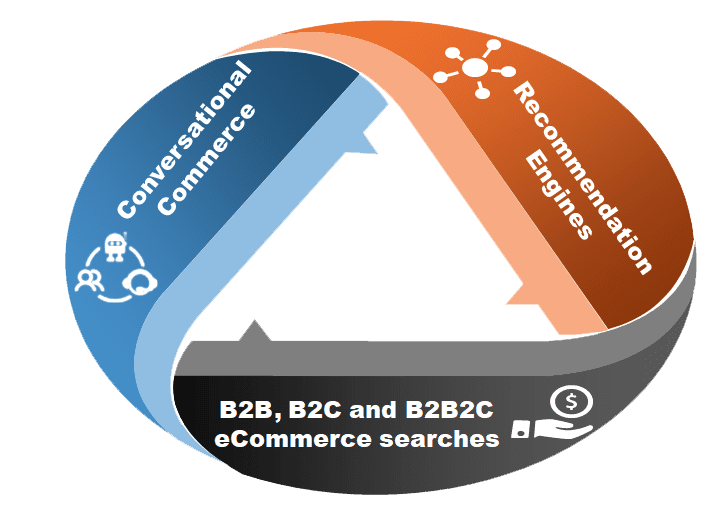Harness the power of Artificial Intelligence to derive higher ROI from your Digital Marketing Initiatives

The holy grail of AI Digital Marketing is to enable businesses to profile, target and engage individual customers and consumers (and potential customers/consumers). Through this process, they seek to build sustainably monetizable emotional connections with the company and its brand(s). Digital technologies are enabling newer and more effective ways of achieving these goals by allowing the collection and analysis of vast amount of data about individual tastes and preferences. Such data are captured from a combination of external sources such as social media platforms, smartphones, IoT devices in “smart vehicles” and “smart homes” and from the company’s internal systems (e.g. CRM, ERP etc.), as well.
Just gathering and storing all this data is of no use, if they do not produce timely and actionable insights for companies to benefit. For example, while a potential customer is browsing various web sites or checking a travel app for airline tickets from one city to another, travel portals or airlines would expect their offers are seen before he or she buys the tickets. There is no point in randomly showing airline ads or “best deals” which may catch sight of the customer after he / she has bought the ticket. Moreover, though the individual has so far only browsed for airline tickets, what if hotels could figure out that this person is considering travel and send him a personalized offer? Those are such holistic capabilities Artificial Intelligence (AI) can offer.
AI capabilities has evolved to a level where they can work in tandem with web sites or portals to enable better targeting right from the “search” stage. In the context of real-time Digital Marketing three AI-powered capabilities are particularly useful:
How does the Blockchain-AI combination enhance security?
Blockchain technology allows data in digital format to be held in a Distributed Ledger shared across millions of computers. Anyone with access to the internet and wishing to participate in the public blockchain network can access the data. This is referred to as a public blockchain, where the data is public but verifiable. On the other hand, private blockchains are permission-based platforms generally established for one or more specific business entities (companies a group of firms, or divisions within an organization). In both types of blockchain, because data is not stored in any one location, it cannot be tampered with. Data is reconciled continuously, so unauthorized changes cannot be made.
To understand blockchains in action, consider a musician who is skeptical about publishing music on the internet due to concerns around plagiarism. Blockchain technology allows the artiste to create a backup that contains pieces of digital music or other materials that can be copyrighted. Once the backup is complete, a certificate with cryptographic evidence is issued to defend the copyright against infringement. The record of the original music pieces and their creation dates are recorded in the blockchain, allowing for confirmation that a piece of music existed at a certain time in the past and was authored by that particular artist. Every transaction is consummated only when the required members of that blockchain network validate the transaction. It is important to note that each member is identified by their digital identity, and not actual identity.
Viewing blockchain through the lens of the “CIA triad” reveals why this technology has definite advantages from security and privacy perspectives.
At another level, newer technologies such as Blockchain are being integrated and supplemented with Artificial Intelligence (AI) to build more robust and trustable systems that significantly reduce the risk of cybersecurity breaches.

- B2B, B2C and B2B2C eCommerce searches that increase the chance of relevant results by looking for adjacent and nearby words. For example, searching for “men’s flip flops” will throw up a range of choices.
- Recommendation Enginesthat make it easier for the person searching to find the most relevant information from the massive pool of information available online- for example, by pointing them to video-tutorials.
- Conversational Commerce Chat interfacesthat enhance shopping experiences based on the intent of the person searching- e.g. searching for “furniture rental services” will show options that cover attributes such as lowest prices, on-time delivery, location etc. This happens even if the user does not explicitly specify these “key words or phrases” in his search.
DARTexon has an out-of-the-box framework that combines Natural Language Processing with Machine Learning to turn specific sets of unstructured, semi-structured and structured data into human readable information. By integrating Recommendation Engines and Conversational Commerce with Search, DARTexon has assisted clients to customize contextual messages for their customers at an individual level, which has resulted in achieving a whopping 28% increase in enquirers within a quarter.
Please contact reachus@dartexon.com to know more about how we can support in achieving your marketing goals, by customizing our solution according to your need and implement it successfully.